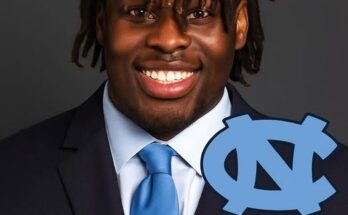BREAKING NEWS: Jared Goff Breaks Down Discussing Lions Trade in Netflix’s ‘Quarterback’ – A Raw, Emotional Look at His Journey
Detroit Lions quarterback Jared Goff is overcome with emotions when discussing his trade to the Detroit Lions on Netflix’s Quarterback, offering fans a rare, unfiltered glimpse into the human side of the NFL. In a league often driven by statistics, contracts, and cold business decisions, Goff’s emotional response reminds everyone watching that beneath the pads and helmets are people—ones who carry dreams, disappointments, pride, and pain. For Goff, being traded wasn’t just about changing teams; it was about rediscovering himself, rebuilding his confidence, and proving that he’s more than just a placeholder or a forgotten talent.
The scene in Quarterback hits hard. Cameras capture the quiet intensity in Goff’s voice, the long pause before he speaks, and the moment when words escape him entirely as the reality of his past and present collide. You can see it in his eyes—the way they shift from distant reflection to present-day pride. This isn’t a man still bitter about being traded from the Los Angeles Rams. This is someone who has done the work, felt the lows, and now finally feels seen again.
When Jared Goff was traded from the Rams to the Lions in 2021, the NFL world saw it as a salary dump, a move meant to upgrade to a more dynamic quarterback in Matthew Stafford. Goff, who had taken the Rams to a Super Bowl just a couple years prior, suddenly became an afterthought—a name in a trade package that felt more like a footnote than a headline. Critics and analysts wrote off his career. Many believed he’d be a stopgap for a rebuilding Lions team, a temporary solution until Detroit found its “real” franchise quarterback. Goff heard it all. And now, years later, he’s showing the world how deeply it impacted him.
In the Netflix series, Goff opens up in a way most players never do publicly. He talks about the moment he got the call, the shock, the silence that followed. For someone who had poured his energy into a franchise, helped take them to the NFL’s biggest stage, and remained the face of their future—being cast aside so abruptly stung. But more than that, it forced Goff to face something every player dreads: doubt. Doubt from coaches. Doubt from executives. Doubt from fans. And perhaps most haunting—doubt from within.
And yet, that doubt became fuel.
Goff’s arrival in Detroit wasn’t met with much fanfare. The team was in a state of flux, recovering from a long history of missteps and misfortunes. The fanbase, while passionate, had grown weary of false hope. But in the midst of the noise, Goff got to work. No grand pronouncements. No flashy declarations. Just preparation, patience, and a determination to rebuild from the ground up. And that process—slow, gritty, and full of quiet progress—has paid off in a way few could have predicted.
Watching Goff reflect on his journey is like watching a man come full circle. In Quarterback, he doesn’t just speak from the head—he speaks from the heart. He talks about the support he received from his now-fiancée Christen Harper, the moments where he questioned everything, and the internal voice that kept telling him to keep going. He speaks candidly about the pressure to perform, the weight of leading a franchise, and the long nights wondering if he’d ever feel wanted again in this league.
But he also speaks about Detroit—the team, the city, the people—and how they welcomed him, not as a temporary fix, but as one of their own. That acceptance didn’t come instantly, and Goff knew he’d have to earn it. And that’s exactly what he’s done. Season after season, he’s stepped up, improved, and evolved. He’s silenced critics with his poise, accuracy, and leadership. And he’s brought hope back to a franchise that had long been starved of it.
What makes the Quarterback moment so powerful is its vulnerability. It’s not often you see an NFL player—especially a quarterback—willing to show raw emotion. The position comes with expectations of stoicism, control, and toughness. Goff breaks that mold, not by abandoning it, but by expanding it. He proves that strength isn’t the absence of feeling—it’s the willingness to embrace it, learn from it, and move forward anyway.
Fans who may have doubted Goff before are now seeing a different side of him. Not just the quarterback who threw touchdowns and led game-winning drives, but the man who took one of the most difficult moments of his career and turned it into a catalyst for growth. His story is now one of redemption—not from failure, but from being underestimated. And in many ways, that mirrors the arc of the Detroit Lions themselves.
The Lions have spent years trying to shake the ghosts of their past. Decades of losing seasons, missed opportunities, and bottom-tier finishes had built a narrative of perpetual disappointment. But in recent years, under head coach Dan Campbell and general manager Brad Holmes, something has shifted. There’s a new energy, a new culture. It’s one built on grit, accountability, and belief. Jared Goff fits into that perfectly. He’s not flashy. He’s not loud. But he’s consistent, resilient, and undeniably effective.
As the camera lingers on Goff in the Netflix series, you can almost feel the weight he’s carried. The trade, the public doubt, the pressure to perform—it’s all there. But so is something else: pride. Pride in what he’s overcome. Pride in how far he’s come. Pride in being part of something special in Detroit.
And that pride is justified. Goff has helped lead the Lions to playoff contention. He’s elevated his game in critical moments, earning the respect of his teammates and the league. He’s formed chemistry with emerging stars like Amon-Ra St. Brown, Jameson Williams, and Jahmyr Gibbs. He’s operated behind one of the NFL’s best offensive lines and made the most of every opportunity. His leadership in the huddle, his control at the line of scrimmage, and his ability to stay cool under pressure have become trademarks of this new-look Lions offense.
Off the field, Goff has also embraced his role in the Detroit community. He’s been involved in charitable initiatives, shown love for the fans, and made it clear that this isn’t just a pit stop in his career—it’s home. That connection between player and city, between leader and locker room, is rare. And it’s one of the reasons Detroit’s resurgence feels real this time.
Netflix’s Quarterback doesn’t just document passes and plays—it captures the emotional weight of the job. Goff’s segment is a reminder that behind every trade, every stat line, every transaction, there’s a human being navigating an emotional, mental, and professional journey. For Goff, the Detroit chapter of that journey has been about proving he belongs—not just in the NFL, but at the center of a franchise with championship aspirations.
And now, as the 2025 season continues to unfold, Goff isn’t just playing with a chip on his shoulder—he’s playing with purpose. He’s no longer trying to escape the shadow of the Rams or chase redemption. He’s focused on writing a new legacy, one built with the Lions, for the Lions. That legacy won’t be measured by one emotional moment on a streaming show, but by what comes next—wins, leadership, resilience, and the continued belief that he is exactly where he’s supposed to be.
Goff’s story is far from over, but this latest glimpse into his past and present makes one thing clear: Jared Goff didn’t just survive the trade to Detroit—he transformed because of it. And the Lions, once overlooked and underestimated like their quarterback, are now thriving with him at the helm.



